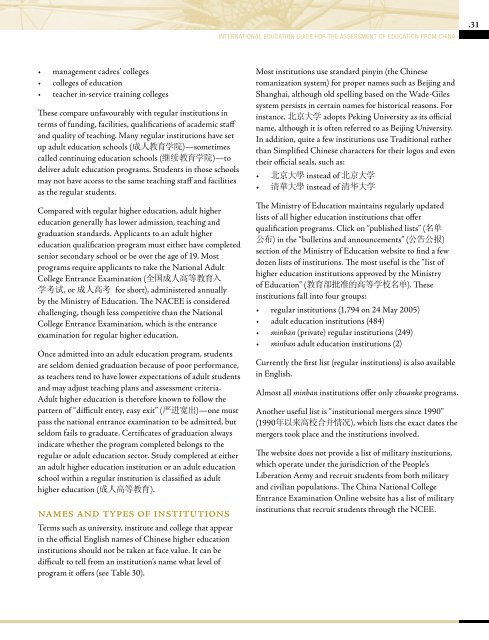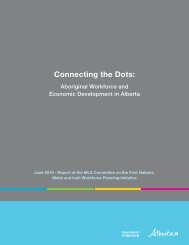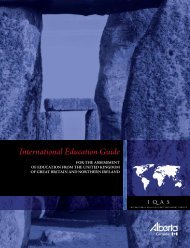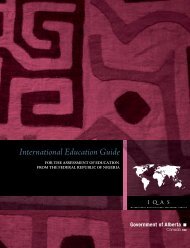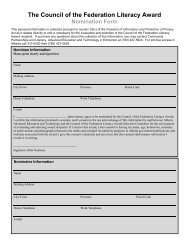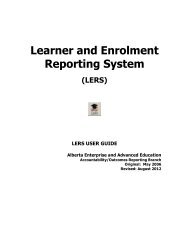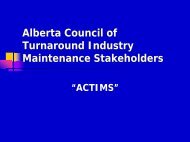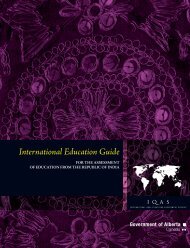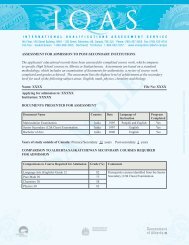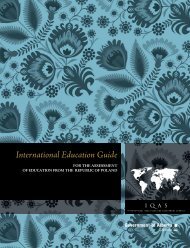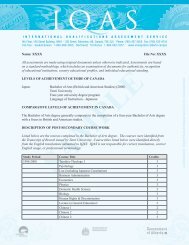International Education Guide - China - Enterprise and Advanced ...
International Education Guide - China - Enterprise and Advanced ...
International Education Guide - China - Enterprise and Advanced ...
You also want an ePaper? Increase the reach of your titles
YUMPU automatically turns print PDFs into web optimized ePapers that Google loves.
INTERNATIONAL EDUCATION GUIDE FOR THE ASSESSMENT OF EDUCATION FROM CHINA<br />
.31<br />
• management cadres’ colleges<br />
• colleges of education<br />
• teacher in-service training colleges<br />
These compare unfavourably with regular institutions in<br />
terms of funding, facilities, qualifications of academic staff<br />
<strong>and</strong> quality of teaching. Many regular institutions have set<br />
up adult education schools ( 成 人 教 育 学 院 )—sometimes<br />
called continuing education schools ( 继 续 教 育 学 院 )—to<br />
deliver adult education programs. Students in those schools<br />
may not have access to the same teaching staff <strong>and</strong> facilities<br />
as the regular students.<br />
Compared with regular higher education, adult higher<br />
education generally has lower admission, teaching <strong>and</strong><br />
graduation st<strong>and</strong>ards. Applicants to an adult higher<br />
education qualification program must either have completed<br />
senior secondary school or be over the age of 19. Most<br />
programs require applicants to take the National Adult<br />
College Entrance Examination ( 全 国 成 人 高 等 教 育 入<br />
学 考 试 , or 成 人 高 考 for short), administered annually<br />
by the Ministry of <strong>Education</strong>. The NACEE is considered<br />
challenging, though less competitive than the National<br />
College Entrance Examination, which is the entrance<br />
examination for regular higher education.<br />
Once admitted into an adult education program, students<br />
are seldom denied graduation because of poor performance,<br />
as teachers tend to have lower expectations of adult students<br />
<strong>and</strong> may adjust teaching plans <strong>and</strong> assessment criteria.<br />
Adult higher education is therefore known to follow the<br />
pattern of “difficult entry, easy exit” ( 严 进 宽 出 )—one must<br />
pass the national entrance examination to be admitted, but<br />
seldom fails to graduate. Certificates of graduation always<br />
indicate whether the program completed belongs to the<br />
regular or adult education sector. Study completed at either<br />
an adult higher education institution or an adult education<br />
school within a regular institution is classified as adult<br />
higher education ( 成 人 高 等 教 育 ).<br />
names <strong>and</strong> types of institutions<br />
Terms such as university, institute <strong>and</strong> college that appear<br />
in the official English names of Chinese higher education<br />
institutions should not be taken at face value. It can be<br />
difficult to tell from an institution’s name what level of<br />
program it offers (see Table 30).<br />
Most institutions use st<strong>and</strong>ard pinyin (the Chinese<br />
romanization system) for proper names such as Beijing <strong>and</strong><br />
Shanghai, although old spelling based on the Wade-Giles<br />
system persists in certain names for historical reasons. For<br />
instance, 北 京 大 学 adopts Peking University as its official<br />
name, although it is often referred to as Beijing University.<br />
In addition, quite a few institutions use Traditional rather<br />
than Simplified Chinese characters for their logos <strong>and</strong> even<br />
their official seals, such as:<br />
• 北 京 大 學 instead of 北 京 大 学<br />
• 清 華 大 學 instead of 清 华 大 学<br />
The Ministry of <strong>Education</strong> maintains regularly updated<br />
lists of all higher education institutions that offer<br />
qualification programs. Click on “published lists” ( 名 单<br />
公 布 ) in the “bulletins <strong>and</strong> announcements” ( 公 告 公 报 )<br />
section of the Ministry of <strong>Education</strong> website to find a few<br />
dozen lists of institutions. The most useful is the “list of<br />
higher education institutions approved by the Ministry<br />
of <strong>Education</strong>” ( 教 育 部 批 准 的 高 等 学 校 名 单 ). These<br />
institutions fall into four groups:<br />
• regular institutions (1,794 on 24 May 2005)<br />
• adult education institutions (484)<br />
• minban (private) regular institutions (249)<br />
• minban adult education institutions (2)<br />
Currently the first list (regular institutions) is also available<br />
in English.<br />
Almost all minban institutions offer only zhuanke programs.<br />
Another useful list is “institutional mergers since 1990”<br />
(1990 年 以 来 高 校 合 并 情 况 ), which lists the exact dates the<br />
mergers took place <strong>and</strong> the institutions involved.<br />
The website does not provide a list of military institutions,<br />
which operate under the jurisdiction of the People’s<br />
Liberation Army <strong>and</strong> recruit students from both military<br />
<strong>and</strong> civilian populations. The <strong>China</strong> National College<br />
Entrance Examination Online website has a list of military<br />
institutions that recruit students through the NCEE.


